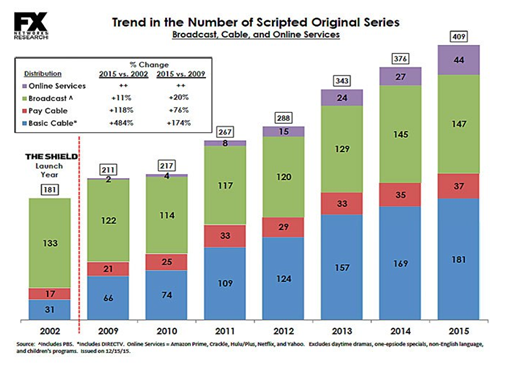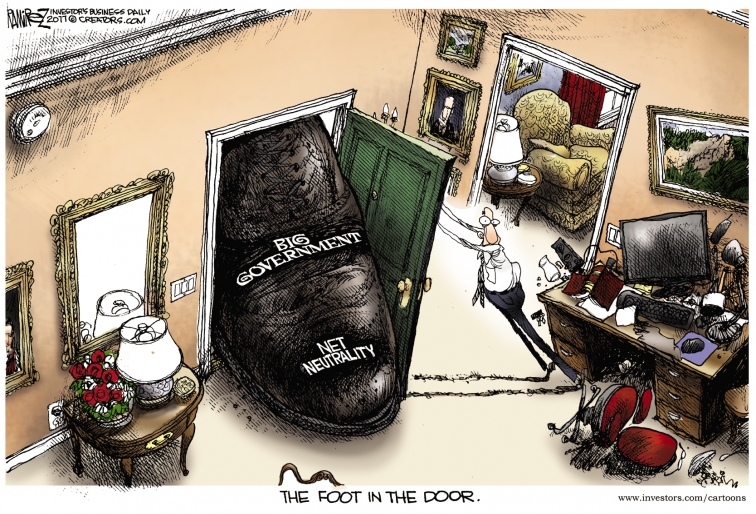This is an amazing time for the film and TV industry, as audiences have never possessed more entertainment choices on more platforms.
To illustrate, FX Networks recently conducted a study demonstrating that the total number of scripted series (think dramas and comedies, not reality-TV) across cable, satellite and online increased to 409 in 2015. That represents a 94% increase from 2009, with a 174% growth in scripted series on basic cable (181 vs. 66). What’s more, all this great content is widely available online. SNL Kagan recently released a report finding that “98% of premium films and 94% of premium TV series were digitally available on at least one of the online services that were reviewed.”

Given this explosion of creativity and innovation, a sense of growing and justifiable bewilderment in the creative community exists over a recent FCC proposal, commonly referred to as “AllVid,” that would force creators, networks, and pay-TV providers to give away their products and services for tech giants like Google to exploit for their own commercial purposes. The beneficiaries of this government handout would be free to repackage video content as they see fit, drop programming or bury it on the channel guide, add their own advertising and strip out existing ads, and mine viewer data – all without negotiating with cable programmers or distributors or adhering to privacy laws and regulations that apply to traditional providers.
Further, there is nothing in the proposed rule to stop tech companies from combining legitimate content with video from piracy sources. “Walking Dead” producer Gale Ann Hurd articulated these concerns well in a recent USA Today op-ed stating:
[The proposal] would also allow Google — and for that matter set-top box manufacturers from all over the world, including China (where rogue boxes are being built by the millions) — to create and market applications or boxes with software that will treat legitimate and stolen material exactly the same, and may in many cases help to steer consumers to piracy.”
Her concern regarding piracy-laden devices is legitimate. As just one recent example, the UK’s Police Intellectual Property Crime Unit arrested six people for selling Android set-top boxes modified to deliver illegal movies and TV shows. And Hurd’s concerns about boxes manufactured in China are made plain in this Forbes article.
Proponents of AllVid claim they merely want to show consumers “all their video,” meaning they want to mix and match content from YouTube and other online sources with pay-TV. Setting aside the fact that existing technologies like Roku and Apple TV already provide that capability, the creative community is understandably nervous about stolen content appearing alongside legitimate video if Google gets its way with the set top box proposal. As Hurd points out, “Google’s search engine does this today. Here’s what happens when I search “www.google.com/?gws_rd=ssl#q=watch+Fear+the+Walking+Dead">watch www.google.com/?gws_rd=ssl#q=watch+Fear+the+Walking+Dead">Fear the Walking Dead.”
The role search plays in facilitating piracy is significant, so those concerns about the mixing of stolen online video with legal pay-TV content are well founded. According to one survey, 74% of consumers say they used a search engine when they first viewed pirated content. And researches at Carnegie Mellon University conducted an experiment conclusively demonstrating that search rankings drive consumer behavior. The more prominently pirated content appears in search results, the more likely consumers are to choose it.
Worse, TorrentFreak recently reported that Google Now is pushing links to piracy sites, even when consumers don’t engage in any search at all. As TorrentFreak explains:
Google can’t read people’s minds but it does harvest data from Google accounts in order to provide its Now services. That includes your search and location history, sites you’ve visited and the content of Gmail messages. It can also access your phone contacts, calendar entries and even certain apps.”
In this instance, after Google Now determined that user Ryan Raab had “shown an interest” in the movie “Deadpool,” it proactively delivered a link to one of the largest torrent sites in the world, 1337x (see the screenshot below). The troubling nature of this behavior can’t be understated. Based on data collected across multiple services, Google’s algorithm unilaterally suggested Raab access stolen content – without any action on his part. The FCC’s proposal would only increase the likelihood that Google continues to engage in such irresponsible conduct.

Creators like Hurd have fought hard to keep the pay-TV environment piracy-free. But the FCC – in its eagerness to foment “innovation” – seems determined to compromise the integrity of the creative ecosystem that has produced an explosion of creativity and innovation. AllVid supporters see content merely as bait – a digital lure to attract their ultimate prize: data. If Google and the FCC succeed, creative content could be taken without negotiation or compensation and used by large tech companies to collect consumer viewing data – thereby undermining the economics of creation and consumer trust in one fell swoop.
Or as Hurd puts it, “I’m afraid that all of us who create, market and broadcast legitimate content will be like the zombies on my show: the walking dead.”




 CFIF Freedom Line Blog RSS Feed
CFIF Freedom Line Blog RSS Feed CFIF on Twitter
CFIF on Twitter CFIF on YouTube
CFIF on YouTube